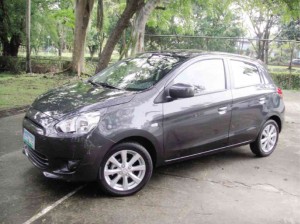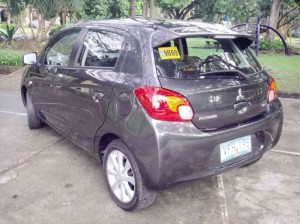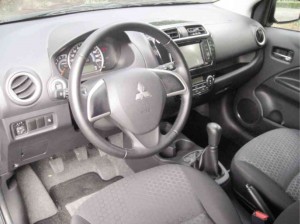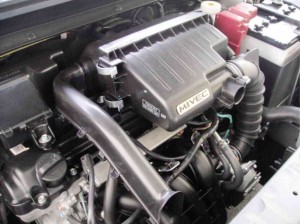Sometimes you wonder why a little budget car like the Mitsubishi Mirage was tested on a big racetrack like the Bira Circuit in Thailand half a year before its launch on the Philippine market. The low-tech, low-cost, lightweight Mirage is by no means a high-performance car or sports car whose power, speed and agility needs to be proven on a racing circuit.
So it’s only logical, after driving the Mirage at Bira last May under the supervision of Thai marshals, to want to test it, unsupervised and in real-time, on the mean streets of Metro Manila. That’s because the Mirage—which debuted in 1978 and was replaced by the Colt in 2003 after selling more than five million units globally to be reborn in 2012—is a simple, affordable subcompact car designed for city driving more than anything else.
Historically, the Mirage is an entry-level, small econocar, but Mitsubishi Motors Corp. is betting big bucks on its return to the global market, this time as a certified eco-car built on an all-new platform with an all-new 3-cylinder 1.2-liter twin cam 12-valve MIVEC (Mitsubishi Innovative Valve timing Electronic Control) engine mated to either a Continuously Variable Transmission (CVT) or a 5-speed manual gearbox. Mitsubishi built a third new factory in Laem Chabang, Thailand dedicated solely to producing 150,000 Mirage units a year mainly for export worldwide with the end in view of eventually ramping up production to 200,000 units annually.
ECO-CAR. Mitsubishi anchors the 2013 Mirage’s global eco-car claim on the following assertions: that it is more fuel-efficient (21 kilometers per liter) than a hybrid car, which is much more expensive to buy and maintain; it spouts only 113 grams of carbon dioxide per kilometer, thus achieving EURO 4-level emissions performance; its curb weight of 850 kg and 0.29 coefficient of drag are the lowest in its class; it meets Unece (United Nations Economic Commission for Europe) Vehicle Regulations’ passenger safety standards for front and side impact; it has a 5-year or 100,000-km warranty, whichever comes first.
The Mirage may be all these, but what’s it like to drive in real-time in Metro Manila? To find out, I borrowed a GLS MT (manual transmission) unit for a week. In city traffic, the Mirage offers a smooth ride and easy maneuvering in tight spots due to its 9.2-meter turning radius. Its softly tuned suspension (MacPherson strut coil spring in front, torsion beam at the rear) soaks up minor imperfections in the road surface, but riding comfort is compromised over potholes and manhole covers.
The chain-driven 3-cylinder engine is noisy when revved and, as expected, does not deliver power smoothly, yet produces a sprightly enough performance due partly to the light (850 kg) curb weight of the car. There is considerable body roll when pushed hard through corners and some wind noise on the highway.
The Mirage MT is simple and easy to drive around town with its straightforward 5-speed stick shift and simple, easy-to-use dashboard layout. The MT gearbox uses the power and torque on tap better than the CVT, giving a linear sense of acceleration and a more enjoyable driving experience. The Mirage is more powerful, producing 78 Ps and 100 Nm max torque, and feels more solid than the other 3-cylinder 12-valve Japanese brand subcompact.
SPACIOUS. The Mirage can accommodate four average-size adults including driver but squeezing in a fifth passenger is not recommended unless for a short trip only. The rear bench seat is surprisingly spacious with generous headroom and legroom. It splits 60:40 to fold down and increase cargo space from 235 liters to 599 liters. Although the low beltline and slim A pillars allow for good forward and side visibility, rearward vision is obstructed by the thick C pillars and rising window line.
With its front dual SRS airbags, ABS with EBD, side impact beams and high tensile strength Reinforced Impact Safety Evaluation (RISE) body, you feel safe enough driving a Mirage—when you drive in a responsible way, given the car’s small size. The brakes are 13-inch ventilated discs in front and 7-inch leading and trailing drums at the rear with an 8-inch master vacuum brake booster.
Four variants of the Mirage are offered by Mitsubishi Motors Philippines: the GLX MT (P498,000), GLX CVT (P548,000), GLS MT (P588,000) and GLS CVT (P638,000.) The GLS models, which cost P90,000 more than the GLXs, have keyless operating system, engine push stop/start button, fully automatic air-conditioner, 15-inch alloy wheels, stabilizer on the front suspension, brake override system, three 3P ELR seatbelts on the rear seat, two ISO-Fix child restraints, two tether anchors and a leather-wrapped steering wheel with silver accent. Plus a DVD player with 7-inch touch screen monitor, radio-CD with MP3 player, Bluetooth, USB port and front AUX-in. If you ask me, the best buy in the lot is the fun-to-drive GLS MT.
In emerging markets like the Philippines, the affordable retail prices of the Mirage variants are obviously targeting fleet sales, first-car buyers (as a graduation gift or a young couple’s first family car), a second car for city errands as an urban runabout. In mature markets, the no-frills Mirage may attract senior citizens and retirees who want to get rid of excess baggage (like big, heavy, fuel-guzzling vehicles) and return to “keeping things simple, affordable and efficient”—exactly the mantra of Mitsubishi’s “Global Small Concept.”
TODAY’S Q & A: What motor vehicle was in the Bible? Answer: A Honda, because the Apostles were all in one Accord.





